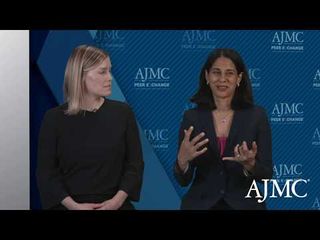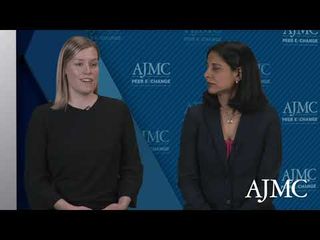
Clinical
Latest News
With more women dying annually from chronic obstructive pulmonary disease (COPD) than men since 2000, researchers have examined trends in COPD hospitalization and in-hospital mortality, evaluating for differences by sex and race. They presented their research at the American Thoracic Society 2017 International Conference.
Latest Videos

CME Content
More News

New data has demonstrated an association between high Vectra DA scores and an increased risk of joint damage progression in patients with rheumatoid arthritis.

On June 14, 2017, Western Connecticut Health Network (WCHN) announced its launch of a new study that will research the connection between pancreatic cancer and new-onset diabetes. This $2.7 million study will span 3 years and aims to discover a method to detect pancreatic cancer while it can still be cured.

A meta-analysis spearheaded by The International Testicular Cancer Consortium has identified new susceptibility loci in the human genome that can increase a person’s risk of developing inherited testicular germ cell tumors.

An update on the latest developments in clinical and healthcare services research in oncology.

A drug previously used in an attempt to treat cancer, now has the potential to be repurposed to treat Duchenne muscular dystrophy.

High-quality cancer care can only occur when the “transitions in care” are delivered in a prospectively planning, systematic, patient-centered way.

Data presented by the FDA at the 2017 American Society of Clinical Oncology Annual Meeting identified a need for educating community-based oncology practices on testing for programmed death-ligand 1 (PD-L1) protein expression before patients diagnosed with metastatic non-small cell lung cancer (mNSCLC) are treated with nivolumab or pembrolizumab.

Patients with psoriasis often have lower success treatments with biologic agents in clinical practice than clinical trials, leading to higher doses and therefore higher annual treatment costs.


The theme of this year's American Society of Clinical Oncology (ASCO) Annual Meeting was Making a Difference in Cancer Care With You.

A new study analyzing breast cancer data in the SEER database has concluded that small tumors detected following a mammography might be small because they are slow-growing, and not necessarily because they were detected early.

A phase 1 study, presented at the 2017 American Society of Clinical Oncology Annual Meeting, found that including daratumumab can improve patient response to treatment in newly diagnosed multiple myeloma.

A new study estimates that the cooperative research network SWOG, which is sponsored by the National Cancer Institute (NCI), has considerably impacted the US population over its 60-year history, as its 23 positive clinical trials have generated about 3.34 million life-years gained.


Updated results from the POLLUX and CASTOR trials, presented at the 2017 American Society of Clinical Oncology Annual Meeting, have found that including daratumumab in standard-of-care regimens prolonged progression-free survival (PFS) and improved the depth of response, independent of the patients’ cytogenetic risk.

At the 2017 American Society of Clinical Oncology Annual Meeting, oncologists heard from fellow experts on the best way to navigate this daunting payment reform challenge.

Craig Portell, MD, of the University of Virginia Health System, highlights some of the latest and most exciting treatments in non-Hodgkin's lymphoma, including CAR-T therapies and targeted therapies such as venetoclax.

The impact that generics have on bringing down the cost of branded drugs needs to happen in the biologics space so the industry can save money and improve access to medications and population outcomes, according to Edward Li, PharmD, MPH, BCOP, of the University of New England.

A phase 3, randomized, double-blind registration study in patients with breast cancer receiving neoadjuvant myelosuppressive chemotherapy has found clinical equivalence between filgrastim and its biosimilar after switching studies.

A poster discussion session at the 2017 Annual Meeting of the American Society of Clinical Oncology examined retrospective surveillance data in 3 different cancers: non-small cell lung cancer, head and neck cancer, and colorectal cancer.

One of the kickoff sessions on the first day of the 2017 American Society of Clinical Oncology Annual Meeting in Chicago, Illinois, was a lively discussion on ensuring that the data used to inform patient care and create healthcare policies holds value.

A late afternoon extended education session on the first day of the 2017 American Society of Clinical Oncology Annual Meeting in Chicago, Illinois, was a discussion on the state-of-the-art uses for immunotherapy in the management of non-small cell lung cancer (NSCLC).

Checkpoint inhibitors have begun to revolutionize bladder cancer treatments, but the benefits in prostate cancer are a little less clear at this point, explained Daniel George, MD, of the Duke Cancer Insitute.

Patients with cystic fibrosis face a lifetime of time-consuming treatment. There are new breakthrough therapies that not only treat symptoms of the disease, but also the underlying causes, which represents a source of hope for patients. However, barriers to treatment still stand in the way, according to a new white paper from the Cystic Fibrosis Engagement Network.

Analysis of data available within a national hospital-based registry showed that the diagnosis of stage I disease increased for female breast cancer, colorectal cancer, and lung cancer following implementation of the Affordable Care Act (ACA).















